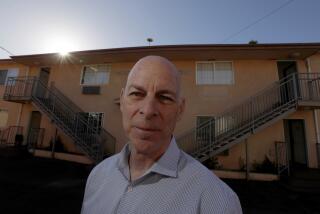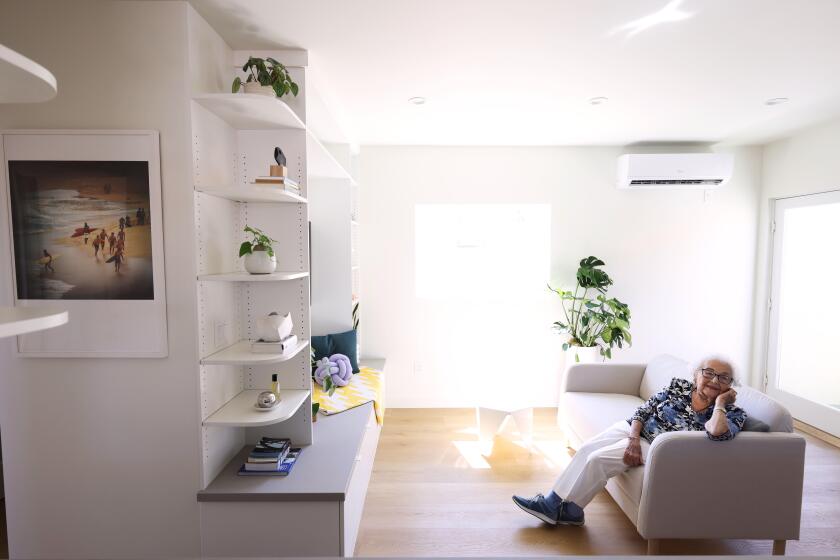Levi Kingston’s Dream Took a While to Bloom
It looked like any old grand opening. Balloons and people in business suits. They had come to the corner of Hoover and 32nd streets near USC to christen a new day-care center for children of low-income families, to admire the fresh tan stucco and bright green metal framing of the building.
But there was something special going on here too. Unofficially, it was Levi Kingston Day.
Levi Kingston is a pudgy, bearded, 47-year-old man who runs a cluster of nonprofit organizations under the heading Community Consortium. Back in 1976, he had an idea of putting a child-care center in the middle of the Los Angeles Community Redevelopment Agency’s Hoover Street area renovation program.
It took him 12 years.
In this era of professed political concern for working mothers and families and “latch-key” children it’s hard to appreciate how little attention used to be paid to such issues a decade ago. After all, as Kingston likes to say, children don’t vote.
Still, Kingston and several other community activists were able to convince Mayor Tom Bradley of the merits of their idea, and Bradley encouraged the CRA to include a day-care center in its Hoover Street area plan.
By 1977, Kingston had found state government money to pay for staffing an inner-city day-care program. But the CRA’s commitment to provide a site and the subsequent construction were going to take years to fulfill, and he wanted to start now. He needed a place.
He found it in the basement of Roger Williams True Love Missionary Baptist Church on Adams Boulevard. That was where the day-care center opened that same year.
Help and advice began to flow in from places such as USC’s Andrus School of Gerontology and nearby 32nd Street Elementary School. Senior citizens were recruited to work with children under the federal Foster Grandparents program. Local teen-agers were recruited as counselors through city-funded summer jobs.
There were bumps. Soon after the center opened, the minister of the church died, and the school was left homeless. Some of Kingston’s fellow board members found another temporary home on Jefferson Boulevard. The plan for the new center bogged down in bureaucracy. It was not until 1982 that ground-breaking was held on the land acquired by the CRA. Then inflation set in. The planned construction budget of $235,000 was rendered woefully insufficient. Only the new-found assistance of the city’s Community Development Department, which channels state and federal funds to social service agencies, saved the project. In 1984, the Olympics came to town and planning was stopped again.
It was not until last month that the Hoover Intergenerational Care Center, built at nearly four times its planned cost, was ready for a public unveiling. The new center, expected to open by the end of the month, can serve 72 children, twice as many as the old center on Jefferson. But Kingston and his cohorts still have to hustle. Before the enrollment can be increased, they have to find some more state or private funds to make up for the low fees charged to parents.
During the dedication, speaker after speaker walked to a microphone and testified that the building they were honoring could not have been built without Levi Kingston’s tenacity.
“He is one of the finest community entrepreneurs in the world,” said Dr. Thomas Kilgore Jr., one of the founders of the project and a member of the redevelopment agency board. “The dream was born in his mind. . . . He moves in and out of more doors than anybody I know, and usually he gets what he goes after.”
Kingston remained a little incredulous at how long this all took. It had been so long, he noted, that one of his early day-care pupils had been able to walk over to the dedication ceremonies from USC, where she is now a student.
“There were a lot of periods along the way where people didn’t think we were going to make it,” he said. “There were a lot of people who were not paid a dime who made it possible.”
A couple dozen of the child-care center’s preschool-aged pupils, each sporting new blue T-shirts bearing the center’s name, were led onto a portable outdoor stage and began to sing:
Good morning
Good morning
Good morning to you.
And it was.
More to Read
Sign up for Essential California
The most important California stories and recommendations in your inbox every morning.
You may occasionally receive promotional content from the Los Angeles Times.









